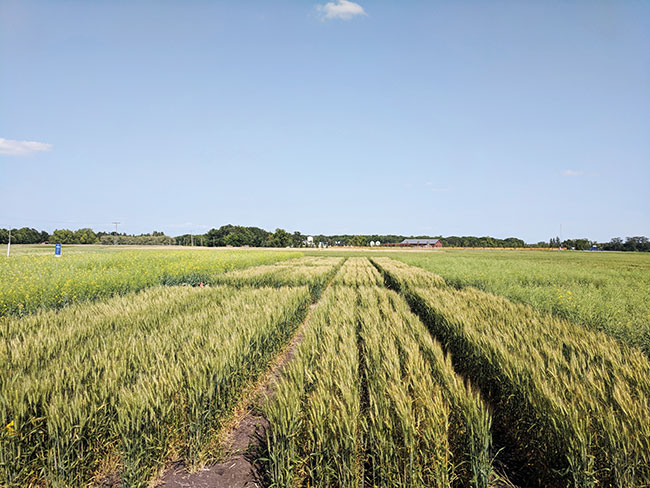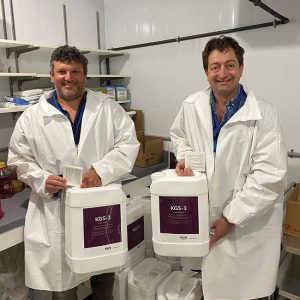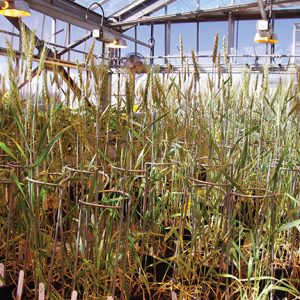
Features
Research
Innovative bio-inoculants improve soil health and crop yields
Naturally derived organism from Manitoba soils enhances P uptake and promotes crop growth.
August 31, 2022 By Donna Fleury
 Field trials with bio-inoculants promote crop growth and increase yields.
Field trials with bio-inoculants promote crop growth and increase yields.
Rising input costs, climate change effects and challenging production environments have researchers and industry exploring new alternatives for improving soil health and yields. One alternative solution may be bio-inoculants, natural micro-organisms applied to soil or plants to improve soil health.
Researchers in Manitoba have isolated naturally occurring soil organisms that support crop production and increased yields while enhancing phosphorus usage.
“We started some initial research work a few years ago trying to address strategies to help resolve the phosphorus (P) issue in Manitoba, with the leaching of excess P from soils into waterways and to Lake Winnipeg,” explains Stan Lozecznik, senior environmental engineer at KGS Group and adjunct professor at the University of Manitoba.
“We were trying to find a strategy to improve the transference and uptake of P by annual crops, an essential nutrient for crop production, to reduce the potential leaching off the field. We discovered a new soil organism unique to the Prairies that can successfully promote crop growth, increase yields and reduce fungal diseases in crops such as wheat, canola and potatoes. These organisms are natural to our ecosystem and biome in agriculture in Manitoba, Saskatchewan and Alberta, so we do not have to rely on introduced strains from outside locations.”
Two phosphate solubilizing bacteria (PSB) strains have been selected from the lab experiments for field testing and commercialization. One of these strains is cold tolerant or has psychrotrophic properties making them idea for cold prairie soils to enhance the transport and uptake of P to the plant roots. Both PSB bacteria are plant growth promoters (PGPR) that improve crop growth and increase yields. One strain also has broader spectrum antifungal activity on different diseases, with results successfully demonstrated in the lab, greenhouse and field trials, including commercial farms in Manitoba and Saskatchewan and research farms at the University of Manitoba and the Crop Development Centre at the University of Saskatchewan. Both strains are compatible and synergistic, and trials are underway to test the results as a combination.
“In field trials in Manitoba and Saskatchewan, our bio-inoculant product KGS-2 increased the average yield in wheat between six and 24 per cent, and 18 per cent in a small plot tomato trial,” Lozecznik explains. “We are continuing field trials in wheat, canola and potatoes to validate the results of KGS-2, and know there is potential to extend to other cereal and grain crops, vegetables, hemp and other horticulture crops. We have also developed another product KGS-3 that is both a growth promoter and a bio-fungicide, with demonstrated ability to reduce various crop diseases including Blackleg, Fusarium head blight and black scurf. KGS-3 received CFIA registration in July 2022, and we are waiting on registration for KGS-2.”
To keep the products simple and easy to use for farmers, three formulations have been developed including foliar, seed coating and in-furrow applications. The formulations and application rates are being optimized in field trials, and shelf-life testing of the products is also underway. Simple large-scale fermentation technology, similar to beer making, will be used for scaling and commercializing the bio-inoculant strains. This production technology has substantial safety and environmental benefits, compared to traditional production of chemical plant stimulants and fungicides. The two new bio-inoculant strains KGS-2 and KGS-3 are patented in Canada and the USA.
These products were developed by the Manitoba Bioinoculants Research and Development Group headed up by Lozecznik with the collaboration of multidisciplinary researchers from the University of Manitoba including Rob Gulden (plant science), John Sorensen (chemistry), Richard Sparling (microbiology), April Johnson (post-doc), Vanessa Demare (KGS Group) and J. Bert Smith (principal at KGS Group). Vikram Bisht, an industry development officer, with a specialization in potato and horticulture crops pathology for the Manitoba Department of Agriculture and Resource Development, has provided expert advice and field trial support for this project.
Lozecznik acknowledges the global growth of biologicals. “Our team is looking for licensing agreements with the right partners or collaborators to commercialize this innovative technology and bring these strong ‘made in the Prairies’ products to market. With this unique innovation, we are trying to provide a local solution for growers that works under our Prairie soil and weather conditions, rather than importing products from other regions or countries with different soils and climate.
“These products meet biological and ecological objectives, as well as fertilizer reductions for climate change goals and improving water quality in Lake Winnipeg and other water bodies. Ultimately this could be an effective treatment option for the future of outdoor and indoor agriculture and help farmers meet production challenges and increase yields in an environmentally friendly way.”

